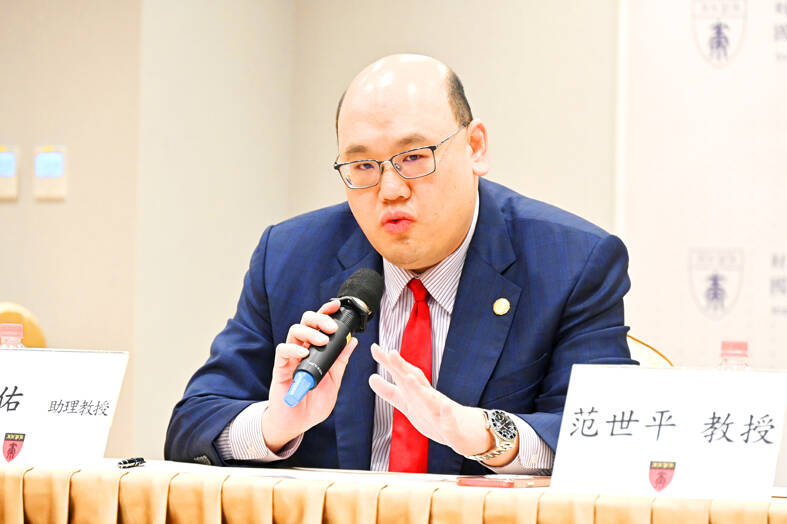China’s military drills around Taiwan this week were aimed at testing the US’ response and strategic bottom line ahead of a potential Washington-Beijing summit, rather than the stated goal of deterring “Taiwanese independence” forces, academics said.
The Chinese People’s Liberation Army’s (PLA) Eastern Theater Command on Tuesday announced it had launched a new round of exercises around Taiwan using army, navy, air and rocket forces to “close in” on the nation from “multiple directions.”
Last night the PLA announced it had concluded the two days of drills.

Photo: Tu Chien-jung, Taipei Times
China’s Taiwan Affairs Office (TAO) said the drills were intended as “a stern warning” to “Taiwanese independence” separatist forces, and would serve as “a resolute punishment” for what it called the “reckless provocations to seek independence” by the administration of President William Lai (賴清德).
Lin Ying-yu (林穎佑), an assistant professor at Tamkang University’s Graduate Institute of International Affairs and Strategic Studies, said the exercises, coming just after US Secretary of Defense Pete Hegseth visited Japan, were aimed at the US.
During his first trip to Japan after taking office, Hegseth met with Japanese Minister of National Defense Gen Nakatani in Tokyo, where they discussed security issues across the Strait.
“The ministers took note of activities by the PLA including the military situation around Taiwan, and emphasized the importance of peace and stability across the Taiwan Strait,” an English-language news release issued by the Japanese Ministry of Defense said.
Despite its rhetoric of “opposing Taiwanese independence” as the reason for launching the drills, China’s decision to start them right after Hegseth’s departure was about testing the US’ bottom line and response regarding security issues across the Strait, Lin said.
Beijing also wanted to understand US President Donald Trump’s stance on the issue, with the aim of gauging the US strategic position ahead of a potential summit between Trump and Chinese President Xi Jinping (習近平), he said.
Echoing Lin, Su Tzu-yun (蘇紫雲), director of the Division of Defense Strategy and Resources at the Taiwan military-funded Institute for National Defense and Security Research, said the drills were aimed at expressing political dissatisfaction toward Washington.
That dissatisfaction stemmed from a Washington Post report published on Saturday last week that said an internal guidance memo signed by Hegseth had reoriented the US military to focus on deterring a potential seizure of Taiwan by China, Su said.
While the PLA’s surprise drills were primarily intended as a message to the US, they might also serve as internal propaganda in China, he said.
The exercises could also be seen as a response to Lai’s speech on March 13, in which he designated China a “foreign adversary” and announced 17 strategies to counter Beijing’s coercion of Taiwan, he said.
Chieh Chung (揭仲), a research fellow at the Association of Strategic Foresight, said the Lai administration was directly named in statements and in videos on the drills by the TAO and the PLA, adding that such direct references showed that the drills could be seen as a response to Lai.
The criticism and the drills could be interpreted as signs that Beijing might be using Lai’s remarks as a pretext to raise tensions across the Strait ahead of a potential Xi-Trump summit, in a bid to gain leverage or create opportunities for negotiation with the Trump administration, Chieh said.

DEFENSE: The National Security Bureau promised to expand communication and intelligence cooperation with global partners and enhance its strategic analytical skills China has not only increased military exercises and “gray zone” tactics against Taiwan this year, but also continues to recruit military personnel for espionage, the National Security Bureau (NSB) said yesterday in a report to the Legislative Yuan. The bureau submitted the report ahead of NSB Director-General Tsai Ming-yen’s (蔡明彥) appearance before the Foreign and National Defense Committee today. Last year, the Chinese People’s Liberation Army (PLA) conducted “Joint Sword-2024A and B” military exercises targeting Taiwan and carried out 40 combat readiness patrols, the bureau said. In addition, Chinese military aircraft entered Taiwan’s airspace 3,070 times last year, up about

A magnitude 4.3 earthquake struck eastern Taiwan's Hualien County at 8:31am today, according to the Central Weather Administration (CWA). The epicenter of the temblor was located in Hualien County, about 70.3 kilometers south southwest of Hualien County Hall, at a depth of 23.2km, according to the administration. There were no immediate reports of damage resulting from the quake. The earthquake's intensity, which gauges the actual effect of a temblor, was highest in Taitung County, where it measured 3 on Taiwan's 7-tier intensity scale. The quake also measured an intensity of 2 in Hualien and Nantou counties, the CWA said.

The Overseas Community Affairs Council (OCAC) yesterday announced a fundraising campaign to support survivors of the magnitude 7.7 earthquake that struck Myanmar on March 28, with two prayer events scheduled in Taipei and Taichung later this week. “While initial rescue operations have concluded [in Myanmar], many survivors are now facing increasingly difficult living conditions,” OCAC Minister Hsu Chia-ching (徐佳青) told a news conference in Taipei. The fundraising campaign, which runs through May 31, is focused on supporting the reconstruction of damaged overseas compatriot schools, assisting students from Myanmar in Taiwan, and providing essential items, such as drinking water, food and medical supplies,

New Party Deputy Secretary-General You Chih-pin (游智彬) this morning went to the National Immigration Agency (NIA) to “turn himself in” after being notified that he had failed to provide proof of having renounced his Chinese household registration. He was one of more than 10,000 naturalized Taiwanese citizens from China who were informed by the NIA that their Taiwanese citizenship might be revoked if they fail to provide the proof in three months, people familiar with the matter said. You said he has proof that he had renounced his Chinese household registration and demanded the NIA provide proof that he still had Chinese